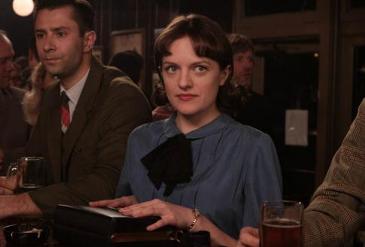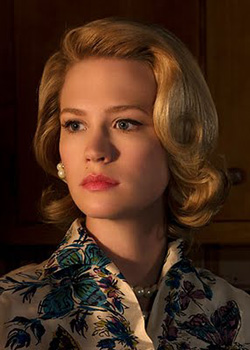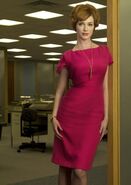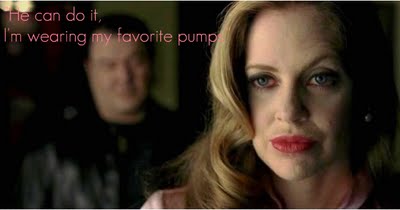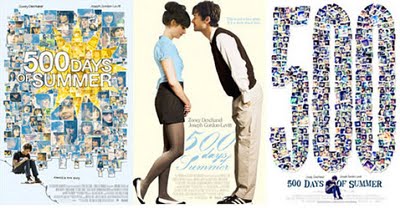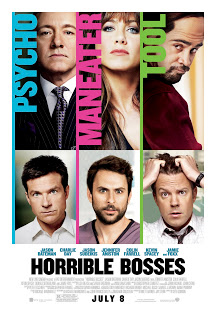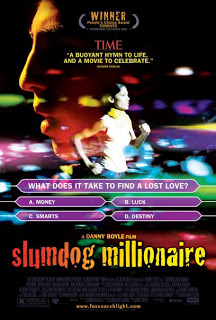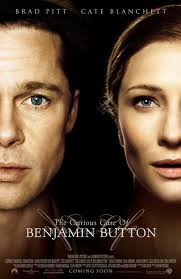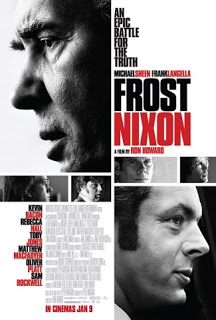Written by Megan Kearns, cross-posted from The Opinioness of the World.
Historians are notorious for savaging historical fiction. We’re quick to complain that writers project modern values onto their characters, get the surroundings wrong, cover up the seamy side of an era or exaggerate its evils — and usually, we’re right. But AMC’s hit show “Mad Men”…is a stunning exception. Every historian I know loves the show; it is, quite simply, one of the most historically accurate television series ever produced. And despite the rampant chauvinism of virtually all its male characters (and some of its female ones), it is also one of the most sympathetic to women…But in 1965, feminism wasn’t a cultural option for most women. It would be another year before the National Organization for Women, the group that gave so many women the legal tools to fight discrimination, would be founded. Newspapers still ran separate want ads with separate pay scales for female jobs, seeking “poised, attractive” secretaries and “peppy gal Fridays.”
“But I have to say, most of the things negroes can’t do, I can’t do either. And nobody seems to care…Half of the meetings take place over golf, tennis, and a bunch of clubs where I’m not allowed to be a member or even enter.”
“What do you do around here besides walking around like you’re trying to get raped?”
there wasn’t even a word for the sexual harassment the character Joan experiences.
Joan’s decision to not go through with her abortion this season stirred up controversy. In an article at RH Reality Check, Sarah Seltzer argues,
“Mad Men” is known for being excruciatingly period-specific. Joan was not at a modern-day abortion clinic and she was not privy to a modern-day abortion debate. She had followed a specific plan which involved breaking the law and risking arrest–which speaks to a strong determination to begin with. There were no protesters and no one to tell her what she did was immoral. Sure, by the standards of her time she was a “loose woman” but there was no pro-life movement calling women selfish babykillers…It’s realistic for her character, the time period, and the plot for Joan to have had the abortion. The show’s writers and the many viewers who think “she didn’t go through with it” are imagining a modern-day conception of abortion fueled by iffy anti-choice tropes found in movies like “Juno” or shows like “The Secret Life of the American Teenager.
The real reason so many fictional characters choose to keep their babies may be much simpler than any of these theories: Babies advance plotlines, whereas abortions end them. As Ted Miller, a spokesperson for NARAL Pro-Choice America, said, “The history of abortion storylines has been mixed. The very personal circumstances are often lost in the pursuit of dramatic or sensationalized storylines.” An abortion can carry a single episode, or a few scenes in a film, while a baby provides fodder for seasons’ worth of material…Sure, Weiner could have found other ways to teach us more about the characters he’s created. But Joan’s decision on Mad Men—and Miranda’s on Sex and the City, and Juno’s in Juno, and so on—show that on screen, advancing the plot is more important than making a political statement.
Obviously Joan is not anti-abortion as she’s had two previous procedures. Barkhorn points out that some say screenwriters don’t want to show abortions as “they don’t want their heroines to appear unsympathetic.” While 1 in 3 women in the U.S. will have an abortion in her lifetime, it’s so rare for a film or TV show to depict that choice. Only a handful of shows have portrayed a character having an abortion including Maude, Private Practice and Friday Night Lights. Barkhorn also points to characters on Sex and the City (Samantha and Carrie) both of whom had abortions in their characters’ past. But when Miranda becomes pregnant and resigned to have an abortion, she backs out at the last moment. While some characters have gone through with abortions, it makes it seem that it’s a decision that young people choose, not successful adult women.
“You do your job so well. They respect you and you don’t have to play any games. I didn’t know that was possible.”
Peggy: “You know I just saved this company. I signed the first new business since Lucky Strike left. But it’s not as important as getting married…again.”
Joan: “Well I was just made Director of Agency Operations, a title, no money of course. And if they poured champagne it must have been while I was pushing a mail cart.”
Peggy: “A pretty face comes along and everything goes out the window.”
Joan: “Well I learned a long time ago to not get all my satisfaction from this job.”
Peggy: “That’s bullshit.”
Then they giggle knowingly.
We should be glad that the writers are resisting the temptation to transform their female characters into contemporary heroines. They’re not, and they cannot be. That is the brilliance of the show’s script. “Mad Men’s” writers are not sexist. The time period was.







